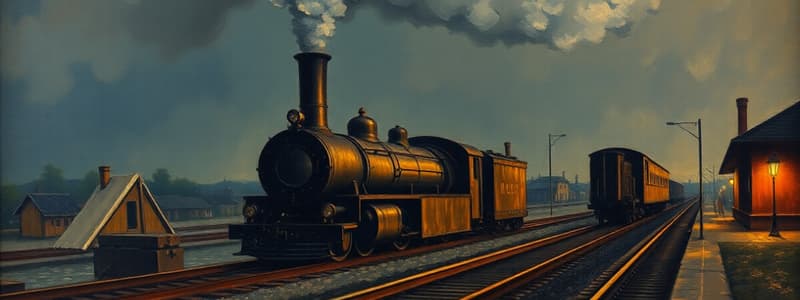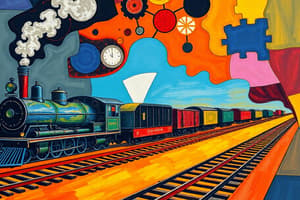Podcast
Questions and Answers
What role did the government typically play during the Age of Big Business?
What role did the government typically play during the Age of Big Business?
- It favored business tycoons over the general populace. (correct)
- It primarily supported the interest of the working class.
- It maintained strict regulations on all businesses.
- It acted as a neutral party in all economic matters.
Which of the following is a key characteristic of a Robber Baron?
Which of the following is a key characteristic of a Robber Baron?
- Innovation and ethical competition in the market.
- Philanthropic endeavors and support for workers' rights.
- Focus on community development and welfare.
- Aggressive business practices for personal profit. (correct)
What distinguishing traits often marked a Captain of Industry?
What distinguishing traits often marked a Captain of Industry?
- Their cultivation of monopolistic practices.
- Their ability to innovate and improve industries. (correct)
- Their commitment to fair labor practices.
- Their disregard for economic regulations.
What circumstances contributed to the rise of both Captains of Industry and Robber Barons?
What circumstances contributed to the rise of both Captains of Industry and Robber Barons?
Which statement best describes the general public's perception of business tycoons during the Age of Big Business?
Which statement best describes the general public's perception of business tycoons during the Age of Big Business?
What significant impact did the expansion of railroads have on the development of the United States?
What significant impact did the expansion of railroads have on the development of the United States?
Which conflict exemplified the tensions between railroad tycoons and the general public?
Which conflict exemplified the tensions between railroad tycoons and the general public?
What did the conflicts between railroad owners and citizens signify in broader terms?
What did the conflicts between railroad owners and citizens signify in broader terms?
What are some significant problems associated with monopolies and trusts during the Age of Big Business?
What are some significant problems associated with monopolies and trusts during the Age of Big Business?
How did the government respond to the issues posed by monopolies and trusts?
How did the government respond to the issues posed by monopolies and trusts?
What does the immigration process typically involve?
What does the immigration process typically involve?
Which of the following represents a challenge faced by immigrants?
Which of the following represents a challenge faced by immigrants?
What can be a factor influencing the decision to immigrate?
What can be a factor influencing the decision to immigrate?
What is a common misconception about immigrant experiences?
What is a common misconception about immigrant experiences?
What is essential for successfully navigating immigration challenges?
What is essential for successfully navigating immigration challenges?
What is a key difference between old and new immigrants?
What is a key difference between old and new immigrants?
Which of the following was NOT a reason people emigrated from their homeland?
Which of the following was NOT a reason people emigrated from their homeland?
What were some common challenges created by urbanization?
What were some common challenges created by urbanization?
How were new immigrants generally treated in their new environments?
How were new immigrants generally treated in their new environments?
Which of the following statements about the challenges of new immigrants is true?
Which of the following statements about the challenges of new immigrants is true?
What was the primary goal of the Progressive Movement?
What was the primary goal of the Progressive Movement?
Who were the muckrakers during the Progressive Era?
Who were the muckrakers during the Progressive Era?
How did progressives generally view government involvement in the economy?
How did progressives generally view government involvement in the economy?
What was one criticism of the Progressive Movement?
What was one criticism of the Progressive Movement?
Which of the following statements about the role of progressives is accurate?
Which of the following statements about the role of progressives is accurate?
What was one benefit of capitalism compared to socialism?
What was one benefit of capitalism compared to socialism?
How did social Darwinism influence the perception of poverty?
How did social Darwinism influence the perception of poverty?
What is one key advantage of vertical integration for tycoons?
What is one key advantage of vertical integration for tycoons?
What was a primary focus of Andrew Carnegie's 'Gospel of Wealth'?
What was a primary focus of Andrew Carnegie's 'Gospel of Wealth'?
What is a drawback of socialism compared to capitalism?
What is a drawback of socialism compared to capitalism?
Study Notes
Railroads and Industrial Growth
- Railroad expansion fueled economic growth and westward expansion.
- Conflicts arose between railroad tycoons and the public.
- Tycoons often used political influence to secure land grants and subsidies.
- Public outcry arose against corrupt practices such as price gouging and unfair competition.
- Monopolies and trusts stifled competition, raised prices, and limited consumer choice.
- Government response included antitrust legislation like the Sherman Antitrust Act.
Captains of Industry vs. Robber Barons
- Government often favored businesses over the interests of the public.
- Characteristics of industrial leaders:
- Entrepreneurial spirit,
- Ruthless business practices,
- Political influence,
- Innovation in business and technology,
- Exploitation of workers and resources.
- Debate on whether these figures were "captains of industry" or "robber barons".
Socialism vs. Capitalism
- Socialism advocates for collective ownership and control of resources, while capitalism promotes private ownership and free markets.
- Socialism aims for equitable distribution of wealth, capitalism emphasizes individual initiative and competition.
- The debate:
- Socialists: criticize capitalism's inequality and exploitation.
- Capitalists: argue for individual freedom and economic growth.
Social Darwinism and the Poor
- Social Darwinism applied Darwin's theory of natural selection to human society.
- Poor were seen as 'unfit' and deserved their condition.
- Justified economic inequality and fueled social unrest.
Industrial Integration and the Tycoons
- Vertical integration: controlling all phases of production, from raw materials to distribution.
- Horizontal integration: dominating a specific market by acquiring competitors.
- Tycoons used these strategies achieved monopolies and maximized profits.
Andrew Carnegie's "Gospel of Wealth"
- Carnegie believed wealth was a responsibility, not a right.
- Philanthropy was advocated as a way for the wealthy to contribute to society.
Immigration to the United States
- Immigration process:
- Navigating complex legal procedures,
- Facing long voyages,
- Adapting to a new culture,
- Dealing with language barriers.
- Challenges for immigrants included:
- Discrimination,
- Low pay,
- Poverty,
- Difficult living conditions.
New Immigrants and Discrimination
- Treatment of new immigrants:
- Often faced hostility and prejudice,
- Experienced discrimination in housing, employment, and social life.
- Examples:
- Anti-immigrant sentiment fueled by fears of competition for jobs and resources.
- Formation of ethnic enclaves to provide support and resist assimilation.
Old vs. New Immigrants
- Old immigrants from Northern and Western Europe,
- Considered more 'assimilated'
- New immigrants from Southern and Eastern Europe,
- Faced greater resistance and prejudice.
Reasons for Immigration
- Economic opportunities,
- Political and religious persecution,
- Wars and famines
Urbanization Challenges
- Overcrowding,
- Poverty,
- Disease,
- Crime,
- Lack of sanitation
The Progressive Movement
- Aimed to reform social and economic problems.
- Progressives:
- Journalists,
- Social reformers,
- Politicians,
- Believed in government intervention to correct inequalities and protect the public interest.
- Muckrakers:
- Investigative journalists who exposed corruption and social problems,
- Prompted public awareness and demand for reforms.
Government Involvement in Capitalism
- Progressives advocated for more government regulation to:
- Protect consumers,
- Ensure fair competition,
- Improve working conditions,
- Address social inequalities.
- Debate:
- Balancing individual freedom with social responsibility,
- The appropriate role of government in a capitalist economy.
Studying That Suits You
Use AI to generate personalized quizzes and flashcards to suit your learning preferences.
Description
Test your knowledge on the impact of railroads on economic growth and industrial development. Explore the controversies surrounding railroad tycoons, government responses, and the debate over their influence as 'captains of industry' or 'robber barons'.




